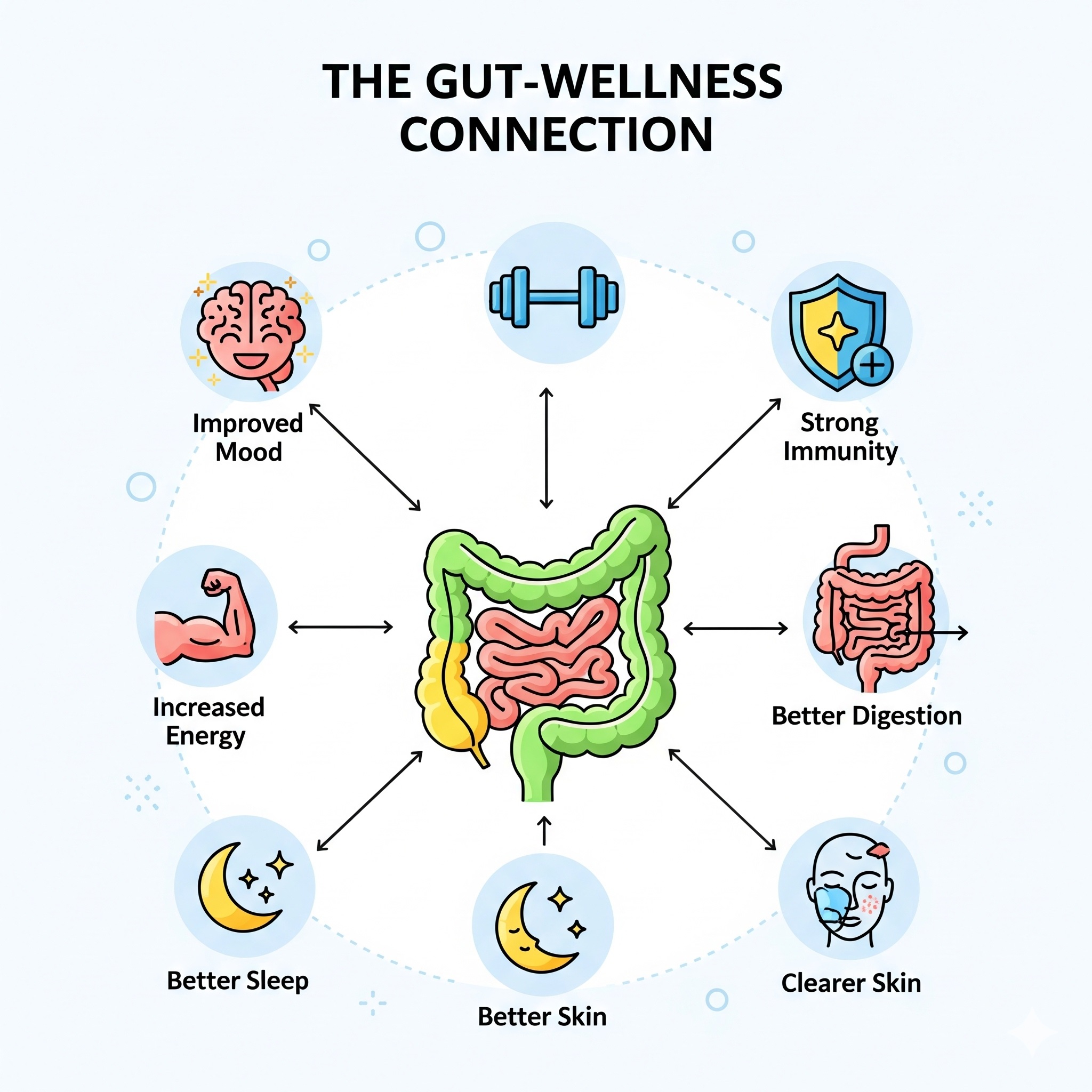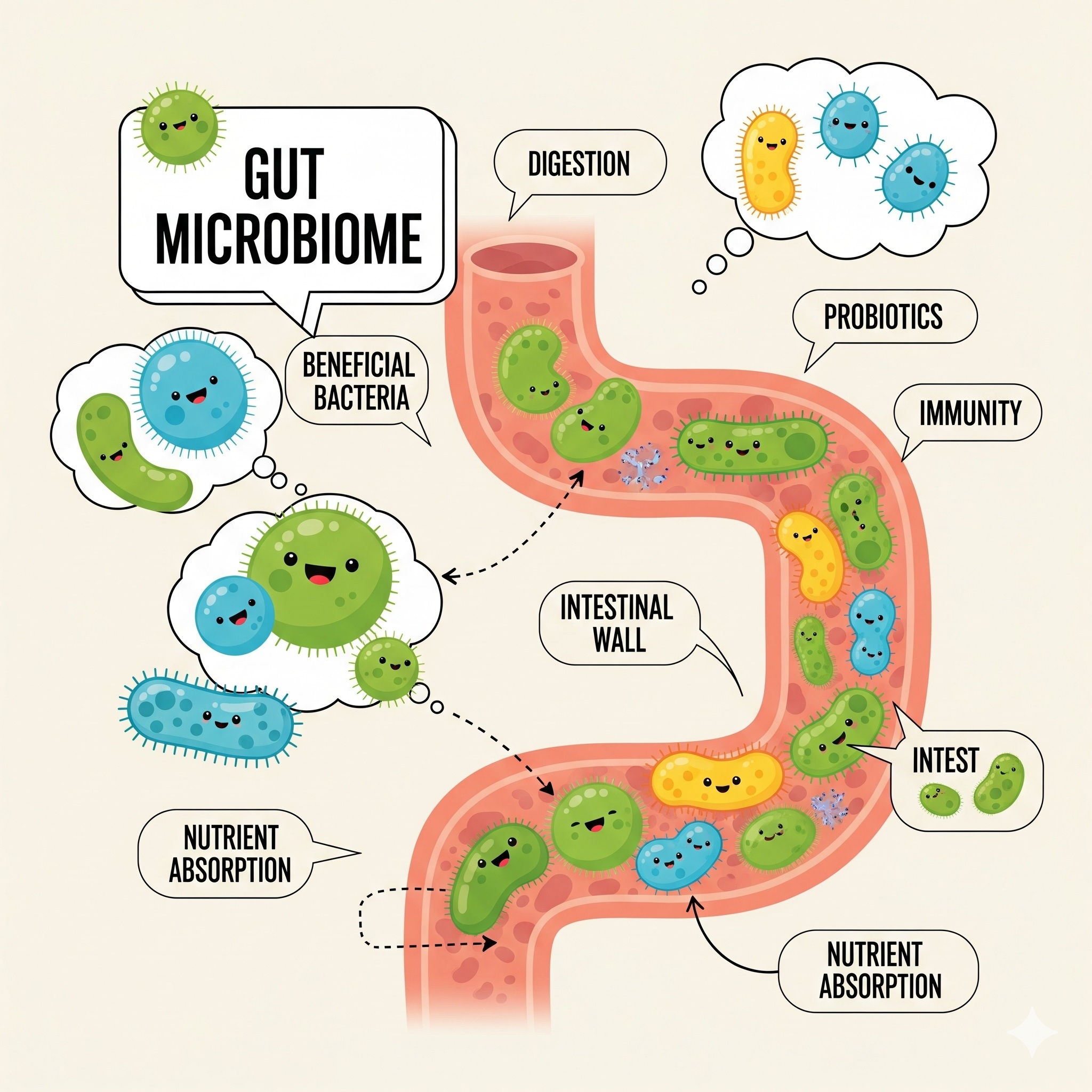When most people think of health, they focus on the heart, the brain, or physical fitness. But science is increasingly clear: your gut plays a central role in overall wellness. The gut is more than just a food-processing system — it’s home to trillions of microorganisms that influence digestion, immunity, mental health, and even energy levels.
In this article, we’ll explore the fascinating connection between gut health, digestive health, and overall wellness, along with actionable steps you can take to support a healthy gut.
The Gut as Your Body’s Command Center
Your gastrointestinal tract isn’t just a passive tube for food — it’s an active, intelligent system sometimes referred to as the “second brain.” The gut contains:
- Trillions of bacteria and other microbes collectively known as the gut microbiome
- A network of neurons called the enteric nervous system
- About 70% of your immune system’s cells
This means your gut is constantly communicating with your brain, immune system, and other organs to maintain balance.
Gut Health Benefits You Should Know
A balanced gut microbiome offers numerous gut health benefits that go far beyond simple digestion.
1. Improved Digestive Health
Healthy gut bacteria help:
- Break down complex carbohydrates and fibers
- Produce short-chain fatty acids that nourish the gut lining
- Maintain regular bowel movements
- Reduce bloating, gas, and discomfort
When digestion runs smoothly, you absorb more nutrients and feel more energized.
2. Stronger Immune System
About 70% of the immune system lives in the gut. Beneficial bacteria teach immune cells to distinguish between harmful invaders and harmless substances, which helps:
- Reduce allergies and sensitivities
- Prevent chronic inflammation
- Strengthen your body’s natural defenses
3. Better Mental Well-Being
Your gut communicates with your brain through the gut-brain axis. Gut bacteria produce neurotransmitters like serotonin and GABA, which influence mood. Supporting gut health may:
- Reduce anxiety and stress
- Improve mood stability
- Support clearer thinking and focus
4. Balanced Weight and Metabolism
Studies show that gut bacteria can influence how your body stores fat, regulates blood sugar, and responds to hunger cues. A diverse microbiome supports:
- Healthy weight management
- Better energy balance
- Reduced cravings for processed foods
5. Reduced Risk of Chronic Disease
Poor gut health has been linked to conditions like:
- Irritable bowel syndrome (IBS)
- Type 2 diabetes
- Autoimmune diseases
- Cardiovascular issues
By improving your microbiome, you may reduce risk factors for many long-term health concerns.
Signs Your Gut Might Be Out of Balance
Not sure if your gut health needs attention? Look out for:
- Frequent bloating, gas, or constipation
- Food intolerances
- Frequent colds or infections
- Skin problems like acne or eczema
- Fatigue or brain fog
- Mood swings or low energy
While these symptoms can have many causes, they may indicate your microbiome needs support.
How to Improve Your Gut for Overall Wellness
The good news is that gut health is highly responsive to lifestyle changes. Here are some science-backed strategies:
1. Eat More Fiber
Fiber acts as prebiotic fuel for good bacteria. Include:
- Vegetables (broccoli, spinach, carrots)
- Fruits (apples, pears, berries)
- Whole grains (oats, quinoa, barley)
- Legumes (beans, lentils, chickpeas)
2. Add Fermented Foods
Fermented foods provide live beneficial bacteria, also known as probiotics. Try:
- Yogurt or kefir
- Sauerkraut
- Kimchi
- Tempeh or miso
3. Consider Probiotic Supplements
When diet alone isn’t enough, high-quality probiotic supplements can help restore microbial balance. Choose multi-strain products with Lactobacillus and Bifidobacterium species.
4. Manage Stress
Chronic stress can disrupt the gut-brain axis. Reduce stress with:
- Meditation or deep breathing
- Light exercise like yoga or walking
- Journaling or mindfulness practices
5. Prioritize Sleep
Aim for 7–9 hours of restful sleep. A consistent bedtime supports your microbiome’s natural rhythm.
6. Move Your Body
Regular exercise promotes microbial diversity and improves bowel motility, both of which are crucial for digestive health.
7. Limit Processed Foods and Sugar
Highly processed foods and excess sugar feed harmful bacteria and yeast, which can disrupt balance. Focus on whole, minimally processed meals.
The Gut-Brain-Immune Connection
One of the most fascinating discoveries in recent years is how interconnected your gut, brain, and immune system are. A balanced microbiome supports:
- Lower systemic inflammation → less risk of chronic disease
- Better stress resilience → healthier mood and focus
- Efficient nutrient absorption → improved energy and recovery
In short, a healthy gut supports overall wellness from head to toe.
When to Seek Professional Help
If you have persistent digestive issues, blood in stool, unexplained weight loss, or severe pain, consult a healthcare provider. A professional can run tests to check for gut imbalances and recommend tailored treatment.
Final Thoughts
Your gut is not just where food is digested — it’s a major player in your overall health. By prioritizing digestive health through a balanced diet, probiotics, stress management, and good sleep, you can unlock powerful gut health benefits that impact your mood, energy, and long-term wellness.
Take small steps today, and your gut will thank you with better digestion, a stronger immune system, and a healthier, happier life.




